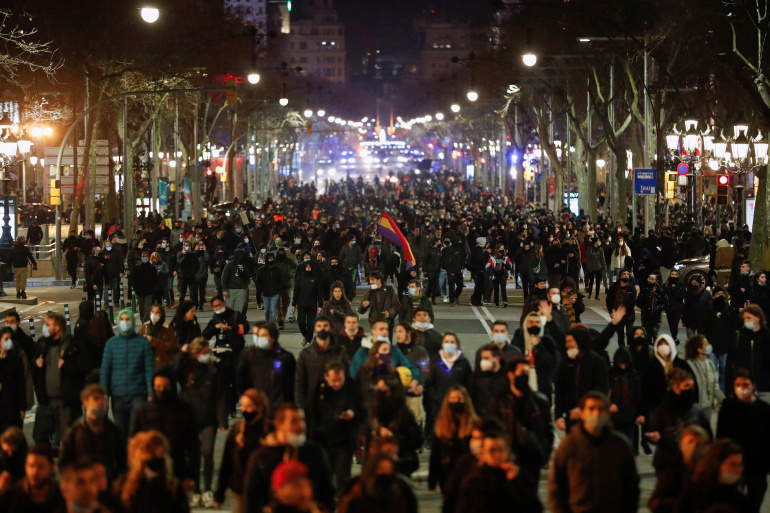Several thousand took to the streets for a fifth straight day in Barcelona and elsewhere to protest against the arrest of rapper Pablo Hasel.
A fifth night of peaceful protests to denounce the imprisonment of Spanish rap artist Pablo Hasel has once more devolved into clashes between police and the members of fringe groups who set up street barricades and smashed storefront windows in central Barcelona.
Small groups made up mostly of young people began their nightly cat-and-mouse game with officers on Saturday evening, an hour after several thousand protesters gathered in the capital of the Catalonia region, which also was where the worst violence took place during earlier demonstrations this week.
On Saturday, rioters looted stores on Barcelona’s main shopping street and then threw stones after police in riot gear poured out of vans to engage them.
Hundreds also gathered in Spain’s capital, Madrid, and hundreds more marched in the northeast town of Lleida, where Hasel was arrested on Tuesday and taken away to begin serving a nine-month prison sentence for insulting the Spanish monarchy and allegedly glorifying “terrorism” in his music.
Some 80 people have been arrested and more than 100 people injured since Hasel’s arrest.
The disorder appears to have come from a fringe group of mainly younger people who constituted a small share of the thousands of participants who joined in marches to support Hasel and to oppose the Spanish laws used to prosecute him.
Barcelona Mayor Ada Colau appealed for calm.
“Defending the freedom of expression doesn’t justify in any case the destruction of property, frightening our fellow citizens and hurting businesses already hurt by the crisis” caused by the pandemic, the mayor said.
Madrid municipal authorities said that 300 National Police officers were called up to assist city police.
 Supporters of arrested Catalan rapper Pablo Hasel protest in Barcelona, Spain, on February 20, 2021 [Albert Gea/Reuters]
Supporters of arrested Catalan rapper Pablo Hasel protest in Barcelona, Spain, on February 20, 2021 [Albert Gea/Reuters]
On Friday, Spanish Prime Minister Pedro Sanchez denounced violent protests saying “violence is an attack on democracy”. The comments came after Sanchez’s junior coalition partners the far-left United We Can (Unidas Podemos), announced their support for the protesters and called for a “total pardon” of Hasel.
The rapper’s case has drawn considerable public attention, with artists, celebrities and politicians expressing support for a change in the country’s so-called “gag law”, which covers freedom of expression and which Hasel was convicted of violating.
Critics say the law curtails free assembly and muzzles dissent.





